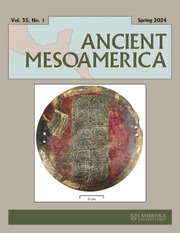Article contents
A DIVINE WIND: THE ARTS OF DEATH AND MUSIC IN TERMINAL FORMATIVE OAXACA
Published online by Cambridge University Press: 13 June 2012
Abstract
This paper examines the social context of music and musical instruments in pre-Columbian Mesoamerica through the detailed analysis of a late Terminal Formative period (a.d. 100–250) burial from the site of Yugüe in the lower Río Verde Valley of Oaxaca. The burial contained a sub-adult male interred with an incised bone flute and a plaster-backed iron-ore mirror. The Yugüe flute is the earliest reported bone flute from Mesoamerica and is incised and carved to create the bas relief image of a skeletal male figure. Based on the instrument's archaeological context and elaborate incising, we argue that the flute was categorized in pre-Columbian ontology as an animate object that actively participated in ceremonial action at Yugüe. While the nature of such ceremony remains unclear, the incising on the flute indicates that the instrument was capable of making manifest ancestral and divine forces affiliated with rain, wind, and agricultural fertility.
- Type
- Research Article
- Information
- Copyright
- Copyright © Cambridge University Press 2012
References
REFERENCES
- 11
- Cited by


